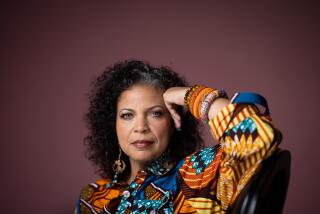Former N.Y. Rep. Bella Abzug Dies at 77
- Share via
NEW YORK — Former Rep. Bella Abzug, whose forceful feminism and flamboyant hats made her a celebrated pioneer of the women’s liberation movement, died at 77 Tuesday after heart surgery.
She had been in poor health for several years and had been at the Columbia Presbyterian Medical Center in Manhattan for more than three weeks.
With her raspy voice that seemingly could shatter glass--and convention--she bulldozed barriers to equality and fought against the Vietnam War.
Elected to Congress in 1970 with the slogan, “This woman’s place is in the House--the House of Representatives,” the outspoken feminist paved the way for other women to enter politics.
“Bella was bigger than life, a true pioneer in the struggle for women’s equality,” said Health and Human Services Secretary Donna Shalala.
“I remember her as an incredible mind, someone who could think not only locally but globally,” said Florence Howe, publisher and director of the Feminist Press. “She was a font of wisdom, politically, legally and historically.”
“There are those who say I’m inpatient, impetuous, uppity rude, profane, brash and overbearing,” Abzug wrote in her autobiography, “Bella.”
“Whether I’m any of these things, or all of them, you can decide for yourself. But whatever I am . . , I am a very serious woman.”
A veteran civil rights lawyer--who once hid in the bathroom when the Ku Klux Klan threatened to kill her--and a founder of the peace movement, Abzug ran for mayor against Edward I. Koch and for senator against Daniel Patrick Moynihan, losing both times.
Abzug could be a formidable force when she disagreed with someone.
“She was rough and tumble, foul-mouthed, dedicated, always angry and a defender of women to the end,” said Marty McLaughlin, an Abzug friend and public relations consultant in Manhattan.
“I remember one night she cursed at me for 15 minutes while I was gathering votes for Koch. . . . She was working the room against him. I mean cursed. I mean the longshoreman’s unexpurgated version.
“I got home at midnight and she called me up to apologize. She had a big bark but not a bite. She was much softer than her outside demeanor. The anger she showed was not really her.”
“The soft side of Bella gets lost behind the bulldozer,” said Maggie Peyton, who managed Abzug’s Senate campaign. “She was brilliant and funny and she was kind and generous--but not patient.”
“History will remember her as the earth mother who really performed brilliantly in a whole host of issues, her struggle and successful fight to bring equality and power to women all over the world,” said Koch. “She was a symbol for women all over the world. . . . “
“We had lots of fights. We were fighting all the time. We lived in the same apartment house. I said she lived in the left tower and I in the other one. I am a liberal with sanity. She was a spokeswoman for the left wing of the Democratic Party and she spoke superbly for that wing.”
“If you said, ‘Bella, you’re right,’ it never stopped her,” added David Garth, a political consultant who handled successful mayoral campaigns for John V. Lindsay, Koch and current Mayor Rudolph W. Giuliani. “She just kept going. She could never even hear you surrender.”
Abzug’s late husband, Martin, a stockbroker and author, often waited patiently in the background. Sometimes, he was summoned when his wife was ready by the command: “Martin, come!”
But appearances were deceiving. “There’s a whole emptiness. . . . I think about him being at my side. I think about how he would be reacting, the strength he would be giving me,” Abzug said after his death.
Abzug was born Bella Savitsky in the Bronx. Her father, who emigrated from Russia, ran the Live and Let Live Meat Market in Manhattan. She was president of the student council at Hunter College and received her law degree from Columbia University. During World War II, she worked in a shipbuilding factory.
Later as a labor lawyer, Abzug represented restaurant workers, longshoremen and auto workers. She also started wearing hats--so people wouldn’t think she was a secretary.
As an attorney for the American Civil Liberties Union, she was chief counsel in the Mississippi appeal of Willie McGee, a young black man accused of raping a white woman.
“She got a stay of execution. The Ku Klux Klan threatened to kill her and she had to hide in the bathroom,” said Peyton. McGee was executed in 1951.
As a young lawyer, in the 1950s, Abzug defended people accused of being communists by the late Republican Sen. Joseph McCarthy of Wisconsin. In 1961, the United States resumed nuclear testing and Abzug was a founder of Women’s Strike for Peace.
She was a vehement critic of the Vietnam policies of Presidents Lyndon B. Johnson and Richard Nixon. She also helped found the National Women’s Political Caucus.
On her first day in Congress in 1971, she startled colleagues by introducing a resolution calling for the withdrawal of all troops from Indochina. It was easily defeated. In 1975, she introduced the first lesbian-gay civil rights bill in Congress.
In later years, though confined to a wheelchair, she was a key player in Beijing in 1995 at the United Nations Fourth World Conference on Women and relished working to improve the status of women around the world.
“Bella was a passionate, outspoken woman who entered politics because she really believed in certain specific things,” said her longtime friend Ronnie M. Eldridge, a member of the City Council from Manhattan. “Her career was fast-moving. She was able to do so many things. . . . She would have liked to have been president.”
Times staff writer Marlene Cimons in Washington and special correspondent Lisa Meyer in New York contributed to this story.
More to Read
Sign up for Essential California
The most important California stories and recommendations in your inbox every morning.
You may occasionally receive promotional content from the Los Angeles Times.













